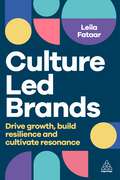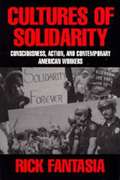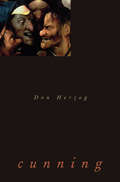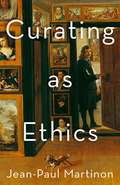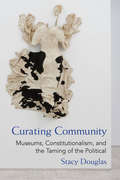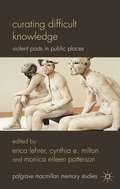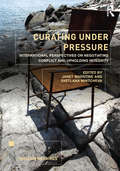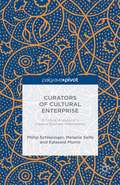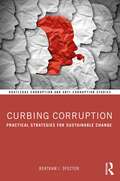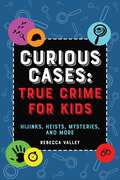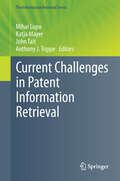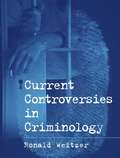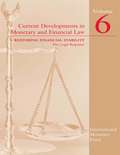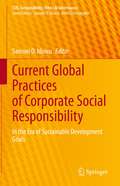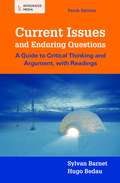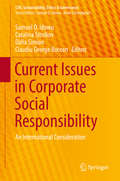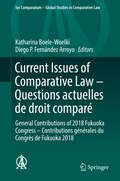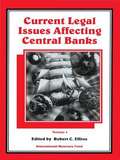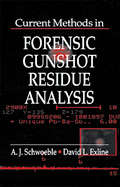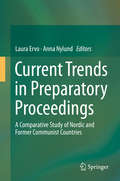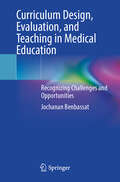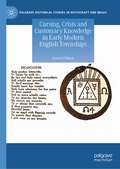- Table View
- List View
Culture-Led Brands: Drive Growth, Build Resilience and Cultivate Resonance
by Leila FataarIn a world of relentless change and pervasive uncertainty, brands can only thrive if they become adept at reading and responding to cultural currents and signals. Today, cultural relevance is not just a marketing output, but a foundational element of successful contemporary business strategy. Brands no longer operate in a vacuum; instead, they are active participants in a global dialogue impacting culture and communities, both geographical and through fandoms. This book equips leaders with the tools to navigate this rapidly evolving business landscape, embracing uncertainty and harnessing cultural relevance to drive growth. Covering everything from marketing to commerce, innovation and creativity, political sensitivity and technology transformations all the way to diversity and inclusion, environmental consciousness and how to credibly leverage the influence of cultural voices, this book enables you to build a culture-led growth strategy and create a resilient brand. With real-world examples from brands like adidas Originals, Guinness and YouTube, this book provides a practical framework for embedding cultural relevance throughout your entire brand. It encourages leaders to rethink not just their external messaging, but their internal values and operations to create a culture-led branding and business strategy that is adaptive, authentic and accountable.
Cultures of Solidarity: Consciousness, Action, and Contemporary American Workers
by Rick FantasiaA commonplace assumption about American workers is that they lack class consciousness. This perception has baffled social scientists, demoralized activists, and generated a significant literature on American exceptionalism. In this provocative book, a young sociologist takes the prevailing assumptions to task and sheds new light upon this very important issue. In three vivid case studies Fantasia explores the complicated, multi-faceted dynamics of American working-class consciousness and collective action.
Cunning
by Don HerzogWant to be cunning? You might wish you were more clever, more flexible, able to cut a few corners without getting caught, to dive now and again into iniquity and surface clutching a prize. You might want to roll your eyes at those slaves of duty who play by the rules. Or you might think there's something sleazy about that stance, even if it does seem to pay off. Does that make you a chump? With pointedly mischievous prose, Don Herzog explores what's alluring and what's revolting in cunning. He draws on a colorful range of sources: tales of Odysseus; texts from Machiavelli; pamphlets from early modern England; salesmen's newsletters; Christian apologetics; plays; sermons; philosophical treatises; detective novels; famous, infamous, and obscure historical cases; and more. The book is in three parts, bookended by two murderous churchmen. "Dilemmas" explores some canonical moments of cunning and introduces the distinction between knaves and fools as a "time-honored but radically deficient scheme." "Appearances" assails conventional approaches to unmasking. Surveying ignorance and self-deception, "Despair?" deepens the case that we ought to be cunning--and then sees what we might say in response. Throughout this beguiling book, Herzog refines our sense of what's troubling in this terrain. He shows that rationality, social roles, and morality are tangled together--and trickier than we thought.
Curating As Ethics (Thinking Theory)
by Jean-Paul MartinonA new ethics for the global practice of curating Today, everyone is a curator. What was once considered a hallowed expertise is now a commonplace and global activity. Can this new worldwide activity be ethical and, if yes, how? This book argues that curating can be more than just selecting, organizing, and presenting information in galleries or online. Curating can also constitute an ethics, one of acquiring, arranging, and distributing an always conjectural knowledge about the world. Curating as Ethics is primarily philosophical in scope, evading normative approaches to ethics in favor of an intuitive ethics that operates at the threshold of thought and action. It explores the work of authors as diverse as Heidegger, Spinoza, Meillassoux, Mudimbe, Chalier, and Kofman. Jean-Paul Martinon begins with the fabric of these ethics: how it stems from matter, how it addresses death, how it apprehends interhuman relationships. In the second part he establishes the ground on which the ethics is based, the things that make up the curatorial—for example, the textual and visual evidence or the digital medium. The final part focuses on the activity of curating as such—sharing, caring, preparing, dispensing, and so on. With its invigorating new approach to curatorial studies, Curating as Ethics moves beyond the field of museum and exhibition studies to provide an ethics for anyone engaged in this highly visible activity, including those using social media as a curatorial endeavor, and shows how philosophy and curating can work together to articulate the world today.
Curating Community: Museums, Constitutionalism, and the Taming of the Political
by Stacy DouglasIn Curating Community: Museums, Constitutionalism, and the Taming of the Political, Stacy Douglas challenges the centrality of sovereignty in our political and juridical imaginations. Creatively bringing together constitutional, political, and aesthetic theory, Douglas argues that museums and constitutions invite visitors to identify with a prescribed set of political constituencies based on national, ethnic, or anthropocentric premises. In both cases, these stable categories gloss over the radical messiness of the world and ask us to conflate representation with democracy. Yet the museum, when paired with the constitution, can also serve as a resource in the production of alternative imaginations of community. Consequently, Douglas’s key contribution is the articulation of a theory of counter-monumental constitutionalism, using the museum, that seeks to move beyond individual and collective forms of sovereignty that have dominated postcolonial and postapartheid theories of law and commemoration. She insists on the need to reconsider deep questions about how we conceptualize the limits of ourselves, as well as our political communities, in order to attend to everyday questions of justice in the courtroom, the museum, and beyond. Curating Community is a book for academics, artists, curators, and constitutional designers interested in legacies of violence, transitional justice, and democracy.
Curating Difficult Knowledge
by Erica Lehrer Cynthia E. Milton Monica Eileen PattersonThis volume inscribes an innovative domain of inquiry, bringing museum and heritage studies to bear on questions of transitional justice, memory and post-conflict reconciliation. As practitioners, artists, curators, activists and academics, the contributorsexplore the challenges of bearing witness to past conflicts. "
Curating Under Pressure: International Perspectives on Negotiating Conflict and Upholding Integrity (Museum Meanings)
by Janet Marstine Svetlana MintchevaCurating Under Pressure breaks the silence surrounding curatorial self-censorship and shows that it is both endemic to the practice and ubiquitous. Contributors map the diverse forms such self-censorship takes and offer creative strategies for negotiating curatorial integrity. This is the first book to look at pressures to self-censor and the curatorial responses to these pressures from a wide range of international perspectives. The book offers examples of the many creative strategies that curators deploy to negotiate pressures to self-censor and gives evidence of curators’ political acumen, ethical sagacity and resilience over the long term. It also challenges the assumption that self-censorship is something to be avoided at all costs and suggests that a decision to self-censor may sometimes be politically and ethically imperative. Curating Under Pressure serves as a corrective to the assumption that censorship pressures render practitioners impotent. It demonstrates that curatorial practice under pressure offers inspiring models of agency, ingenuity and empowerment. Curating Under Pressure is a highly original and intellectually ambitious volume and as such will be of great interest to students and academics in the areas of museum studies, curatorial and gallery studies, art history, studio art and arts administration. The book will also be an essential tool for museum practitioners.
Curators of Cultural Enterprise: A Critical Analysis of a Creative Business Intermediary
by Philip Schlesinger Melanie Selfe Ealasaid MunroThis study is based on the authors' fieldwork inside Cultural Enterprise Office, a small Scottish agency that supports creative businesses. It discusses UK policy on the creative economy, the rise of intermediaries between policy-making and the marketplace, and the playing out in the delivery of business advice services to creative microbusinesses.
Curbing Corruption: Practical Strategies for Sustainable Change (Routledge Corruption and Anti-Corruption Studies)
by Bertram I. SpectorMany anti-corruption efforts have had only a minimal effect on curbing the problem of corruption. This book explains why that is, and shows readers what works in the real world in the fight against corruption, and why. Counter-corruption initiatives often focus on the legal, institutional, and contextual factors that facilitate corrupt behavior, but these have had only nominal impacts, because most of these reforms can be circumvented by government officials, powerful citizens, and business people who are relentless in their quest for self-interest. This book argues that instead, we should target the key individual and group drivers of corrupt behavior and, through them, promote sustainable behavioral change. Drawing on over 25 years of practical experience planning, designing, and implementing anti-corruption programs in over 40 countries, as well as a wealth of insights from social psychological, ethical, and negotiation research, this book identifies innovative tools that target these core human motivators of corruption, with descriptions of pilot tests that show how they can work in practice. Anti-corruption is again becoming a priority issue, prompted by the emergence of more authoritarian regimes, and the public scrutiny of government responses to the COVID-19 pandemic. Straddling theory and practice, this book is the perfect guide to what works and what doesn’t, and will be valuable for policymakers, NGOs, development practitioners, and corruption studies students and researchers.
Curious Cases: Hijinks, Heists, Mysteries, and More
by ValleyIntroduce middle-grade readers to the intriguing and exciting history of true crime, including capers, stories, unsolved crimes, daring escapes, famous art heists, and much more, in this first-ever true crime book specifically for kids.True crime is a genre that captures readers of all ages, but oftentimes the stories are too intense—even for kids who love spooky books and movies. Curious Cases: True Crime for Kids presents a slew of fascinating stories that are all age-appropriate, including: -The Isabella Stewart Gardner Museum theft -The cold case of D. B. Cooper -The disappearance of Masterpiece the poodle -Two brothers' cunning escape from Alcatraz -Sherlock Holmes and the Fairy Photographs -Real-life Ghostbusters -and much more! Plus, kids will love the breakdowns of some of the most iconic pop culture detectives and mystery writers like Agatha Christie. The book even includes some fun forensic science activities that kids can do at home to help them better understand how evidence is found and how mysteries can be solved.
Current Challenges in Patent Information Retrieval (The Information Retrieval Series #29)
by Katja Mayer Mihai Lupu Anthony J. Trippe John TaitIntellectual property in the form of patents plays a vital role in today's increasingly knowledge-based economy. This book assembles state-of-the art research and is intended to illustrate innovative approaches to patent information retrieval.
Current Controversies in Criminology
by Ronald WeitzerThis anthology contains a stimulating mix of articles in the field of criminology, covering 1) the causes of criminal behavior, 2) several new or controversial crimes, and 3) controversial crime fighting methods. It includes both classic works of criminological theory and up to date studies of various crimes and criminal justice responses. The book draws readers into the critical evaluation of the causes of crime and the operations of agencies of control. A three-part organization examines various explanations of criminal behavior, investigates several controversial or “new” types of crime that have generated heated debate in American society, and covers some of the most disputed crime-fighting techniques in America. For individuals interested in the theories and issues of crime and justice.
Current Developments in Monetary and Financial Law, Vol. 4
by International Monetary FundThe papers in this volume are based on the presentations made at the ninth biennial seminar for legal advisers of central banks, 24 May - 4 June 2004, held by the Legal Department and the Institute of the International Monetary Fund (IMF). The seminar covered a broad range of topics: activities of the IMF; sovereign debt restructuring; money laundering and the financing of terrorism; financial system and banking supervision; conflicts of interest and market discipline in the financial sector; insolvency.
Current Developments in Monetary and Financial Law, Volume 5
by International Monetary FundA report from the International Monetary Fund.
Current Developments in Monetary and Financial Law: Restoring Financial Stability The Legal Response, Volume 6
by International Monetary FundA report from the International Monetary Fund.
Current Global Practices of Corporate Social Responsibility: In the Era of Sustainable Development Goals (CSR, Sustainability, Ethics & Governance)
by Samuel O. IdowuThis book addresses the status quo of Corporate Social Responsibility practices and their development since 2008. How have things changed in the practice of CSR? What new opportunities and challenges have arisen? The book reports on an international set of cases and case studies on how CSR is practiced at business and organizations in various countries. It analyzes country-specific and industry-specific issues, as well as general global issues in connection with the United Nations’ Sustainable Development Goals. The contributions gathered here provide comprehensive information on CSR for both practitioners and researchers around the globe.
Current Issues and Enduring Questions
by Sylvan Barnet Hugo Bedau John O’haraThe unique collaborative effort of a professor of English and a professor of philosophy, Current Issues and Enduring Questions is an extensive resource for teaching argument, persuasive writing, and rigorous critical thinking. This extraordinarily versatile text and reader continues to address current student interests and trends in argument, research, and writing. Its comprehensive coverage of classic and contemporary approaches to argument includes Aristotelian, Toulmin, and a range of alternative views, including a new chapter on analyzing and writing about arguments in popular culture. <P><P> Readings on contemporary controversies (including student loan debt, locavorism, and the boundaries of online privacy) and classical philosophical questions (such as How free is the will of the individual?) are sure to spark student interest and lively discussion and writing, and new e-Pages take advantage of what the Web can do by including videos, speeches, film trailers, and other multimodal arguments.
Current Issues and Enduring Questions: A Guide to Critical Thinking and Argument, with Readings Tenth Edition
by Sylvan Barnet Hugo BedauThis book is a text--a book about reading other people's arguments and writing your own arguments--and it is also an anthology--a collection of more than a hundred selections, ranging from Plato to the present, with a strong emphasis on contemporary arguments and, in this edition, new modes of argument, from documentary film trailers to political speeches to infographics.
Current Issues in Corporate Social Responsibility: An International Consideration (CSR, Sustainability, Ethics & Governance)
by Samuel O. Idowu Catalina Sitnikov Dalia Simion Claudiu George BoceanThis book takes a fresh look at current issues in corporate social responsibility (CSR) with a special focus on emerging economies. In particular, it includes dedicated chapters on the theory of CSR, related principles and values, and insights from cross-generational investigations. In turn, the second part of the book examines the relation between financial performance and social responsibility in different industries and types of organizations. The third part presents cases involving emerging economies, and addresses reporting, auditing and accounting, as well as sector-specific issues for e. g. retailing and banking. Lastly, the book tackles the aspects of financial performance and taxation in a number of case studies and practical examples. Overall the book provides cutting-edge insights into the theory and practice of CSR from European countries that can be considered emerging or developing.
Current Issues of Comparative Law – Questions actuelles de droit comparé: General Contributions of 2018 Fukuoka Congress – Contributions générales du Congrès de Fukuoka 2018 (Ius Comparatum - Global Studies in Comparative Law #35)
by Diego P. Fernández Arroyo Katharina Boele-WoelkiOn 22 to 28 July 2018 the International Academy of Comparative Law organized its 20th General Congress in Fukuoka Japan. The General Congresses of the Academy are held every four years and address from a comparative perspective a multitude of topics that appear particularly relevant in our contemporary society. This book gathers a selection of the general contributions to the 20th General Congress dealing with current issues in Comparative Law. This is a premiere for the Academy. It seemed important for the Executive Committee to have access to the general contributions offered during the General Congress which certainly deserve the same attention as the General Reports. Du 22 au 28 juillet 2018 l’Académie internationale de droit comparé a organisé son 20ème Congrès général à Fukuoka au Japon. Les congrès généraux de l’Académie se tiennent tous les quatre ans et abordent dans une perspective comparative une multitude de sujets qui apparaissent particulièrement pertinents dans notre société contemporaine. Ce livre rassemble une sélection des contributions générales du 20ème Congrès général qui traitent des questions actuelles du droit comparé. Il s’agit d’une première pour l’Académie. Il est apparu important pour le Bureau de pouvoir avoir accès aux contributions générales offertes pendant le Congrès général et qui méritent assurément la même attention que les rapports généraux.
Current Legal Issues Affecting Central Banks
by Robert C. EffrosThis volume focuses on how technology is affecting the world of banking and finance in an era of increasing globalization. The advent of electronic money, stored value cards, and Internet transactions are discussed, as well as the impact of technology on cross-border banking and its implications for central banks. Other issues examined are the legal and regulatory frameworks for risk management of banks, sovereign debt, the international laws of bank secrecy, and financial services within the context of the GATT Agreement on Trade Services.
Current Methods in Forensic Gunshot Residue Analysis
by A. J. Schwoeble David L. ExlineWith the improvements in collection methods and analytical tools that allow more thorough analyses, gunshot residue examination has made a dramatic impact as an area of trace evidence essential to the investigation and prosecution of violent crime. Current Methods in Forensic Gunshot Residue Analysis deals with major areas of gunshot residue analysis, including current and future methods of analysis, collection techniques, interpretation of evidence, expert testimony and report writing. This text is a necessity for forensic scientists conducting this type of analysis and anyone involved in the investigation and prosecution of violent crimes involving firearms.
Current Trends in Preparatory Proceedings: A Comparative Study of Nordic and Former Communist Countries
by Laura Ervo Anna NylundThis book explores the regulations, goals and functioning of preparatory proceedings in four Nordic countries and eight former communist countries. The contributions discuss whether, and how the regulation and practice of preparatory proceedings enhance swift civil justice that is both inexpensive and has quality outcomes. A central question is whether the main hearing model of civil justice, in which preclusion of new evidence and claims occur at the end of the preparatory stage, results in greater efficiency, or whether the functioning of civil proceedings largely depends on other factors. It alsoexamines regulation and use of court-connected mediation and judicialsettlement efforts. This book offers comparative insights into the functioningof the preparatory civil proceedings in the countries covered. Preparatory proceedings are considered a key tool for achieving efficient civilproceedings. The claims and factual background of the case are clarified at anearly stage, and the main hearing is focused. Judicial settlement efforts andcourt-connected mediation contribute to early resolution of cases, and areimportant elements of Nordic civil procedure The Nordic countries have used themain hearing model of civil proceedings for some decades, and recent reformshave further enhanced the role of the preparatory stage. Former communistcountries are reforming their earlier piecemeal- format civil proceedings byintroducing and strengthening written and oral preparation, as well as court-connected mediation.
Curriculum Design, Evaluation, and Teaching in Medical Education: Recognizing Challenges and Opportunities
by Jochanan BenbassatThis concise and challenging examination of medical education aims to discuss curriculum design and evaluation in medical schools and to take a fresh look at current trends in patient care and continuing education teaching methods. The ideas and insights provided here are based on the author's long career in clinical practice and teaching medical students and residents. Medical education is no exception to the changes at every level in medicine. For example, the ready access to medical information via the Internet and other media has produced smarter and informed patients. Multi-specialty hospital practice has replaced the individual 'doctor-patient' relationship, perhaps compromising patient care to some extent. New subjects have been added over the years to medical curricula. Nevertheless, there has often been a reluctance to remove older topics, possibly limiting the medical training course's ability to develop as expected. The transition from theories of higher education to the reality of curriculum planning and design is a huge leap. An important question is how to translate the mission of higher education in general which has been variably described as a training of 'reflective individuals' who 'possess both culture and expertise' and can 'master any subject with facility' into a coherent teaching program. The mission of medical education includes the promotion of professionalism in learners by including courses in medical ethics that have become integral to medical education in the USA. However, despite the development of standards and competencies related to professionalism, there is no consensus on the specific goals of medical ethics education, the knowledge and skills expected of learners, and the best pedagogical methods and processes for their implementation and assessment. A significant contribution to the clinical teaching literature, Curriculum Design, Evaluation, and Teaching in Medical Education should be of interest to a variety of readers, including clinical educators, administrators, health care professionals, and especially residency directors.
Cursing, Crisis and Customary Knowledge in Early Modern English Townships (Palgrave Historical Studies in Witchcraft and Magic)
by Karen O'BrienThis book provides a historical and socio-legal investigation into the prevalence of litigation arising from cursing and interpersonal hostility in the under-explored region of Northwest England during a period of acute socio-economic crisis in the seventeenth century. Contributing to the scholarship of magic and witchcraft, it shows the complex circumstances of the world of healing and harming using customary knowledge such as magic and folk medicine as it is variously presented in the documents of the legal system. While primary sources such as pamphlets have usefully informed numerous witchcraft studies, this book establishes popular belief derived from the depositions, interrogatories and various other manuscripts of the manorial, ecclesiastical and secular courts positioned within a micro historical early modern context.
